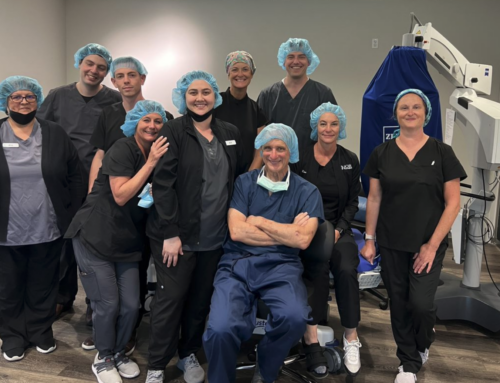
Not all sunglasses are created equal. While the choices are endless, there’s only one thing that tops all sunglass considerations and it has nothing to do with price or brand names. It’s all about the UV protection. Barth Vision and Optical and the American Academy of Ophthalmology want you to know that selecting sunglasses that block 99 to 100 percent of UV-A and UV-B radiation is the best way to protect your eyes from the sun’s damaging rays.
“Wearing sunglasses without 100 percent UV protection is actually a serious health risk,” said Dianna Seldomridge, MD, clinical spokesperson for the American Academy of Ophthalmology. “Regardless of the season, sun exposure can increase the risk of developing growths on the eye, cataracts and some eye cancers. The good news is, protecting yourself from the sun is easy and doesn’t require breaking the bank, just look for the 100 percent UV protection label.”
Look for the label
Only buy sunglasses labeled as 100% UV-A and UV-B or UV400 protection. If you’re unsure if your sunglasses provide proper protection, you can test lenses for UV safety with a photometer at an optical shop.
Size DOES matter
Sunglasses with larger lenses may provide more protection. Wraparound glasses offer the best coverage. These glasses can protect the eye from UV light entering from the side. Wraparounds also protect the eyes from wind, evaporation that may cause dry eye, and foreign bodies, like grit, sand or dust that can irritate the eye.
Price does NOT matter
A heavier price tag does not guarantee UV protection. As long as the 100% UV label is there, cheap sunglasses can be just as effective at protecting your eyes as brand name sunglasses.
Lens type helps with comfort, not UV protection
Darker lenses or polarized lenses do not block more radiation. Lenses can come in different shades, such as amber, gray, or green, but it’s up to personal preference which is best for you. Polarized lenses can help with glare coming off reflective surfaces, making activities like driving or water sports easier and more enjoyable.
Some Seniors May Be Eligible for a Free Eye Exam
For individuals age 65 or older who are concerned about their risk of eye disease, you may be eligible for a medical eye exam, often at no out-of-pocket cost, through the American Academy of Ophthalmology’s EyeCare America® program. This public service program matches volunteer ophthalmologists with eligible patients in need of eye care across the United States. To see if you or a loved one qualifies, visit EyeCare America to determine your eligibility. EyeCare America is co-sponsored by the Knights Templar Eye Foundation Inc., with additional support provided by Alcon and Regeneron.
About the American Academy of Ophthalmology
The American Academy of Ophthalmology is the world’s largest association of eye physicians and surgeons. A global community of 32,000 medical doctors, we protect sight and empower lives by setting the standards for ophthalmic education and advocating for our patients and the public. We innovate to advance our profession and to ensure the delivery of the highest-quality eye care. Our EyeSmart® program provides the public with the most trusted information about eye health. For more information, visit aao.org.
 Our practice philosophy at Barth Vision & Optical is simple, though we like to think it reflects a profound sentiment. We are here to be of service, in the truest sense of the term. We offer State-of-the-art eye examinations, A unique collection of fashion eye wear, Cataract surgery & consultation, LASIK vision correction, Eye Care Telemedicine. Call Today for an Appointment (707) 955-1120.
Our practice philosophy at Barth Vision & Optical is simple, though we like to think it reflects a profound sentiment. We are here to be of service, in the truest sense of the term. We offer State-of-the-art eye examinations, A unique collection of fashion eye wear, Cataract surgery & consultation, LASIK vision correction, Eye Care Telemedicine. Call Today for an Appointment (707) 955-1120.


